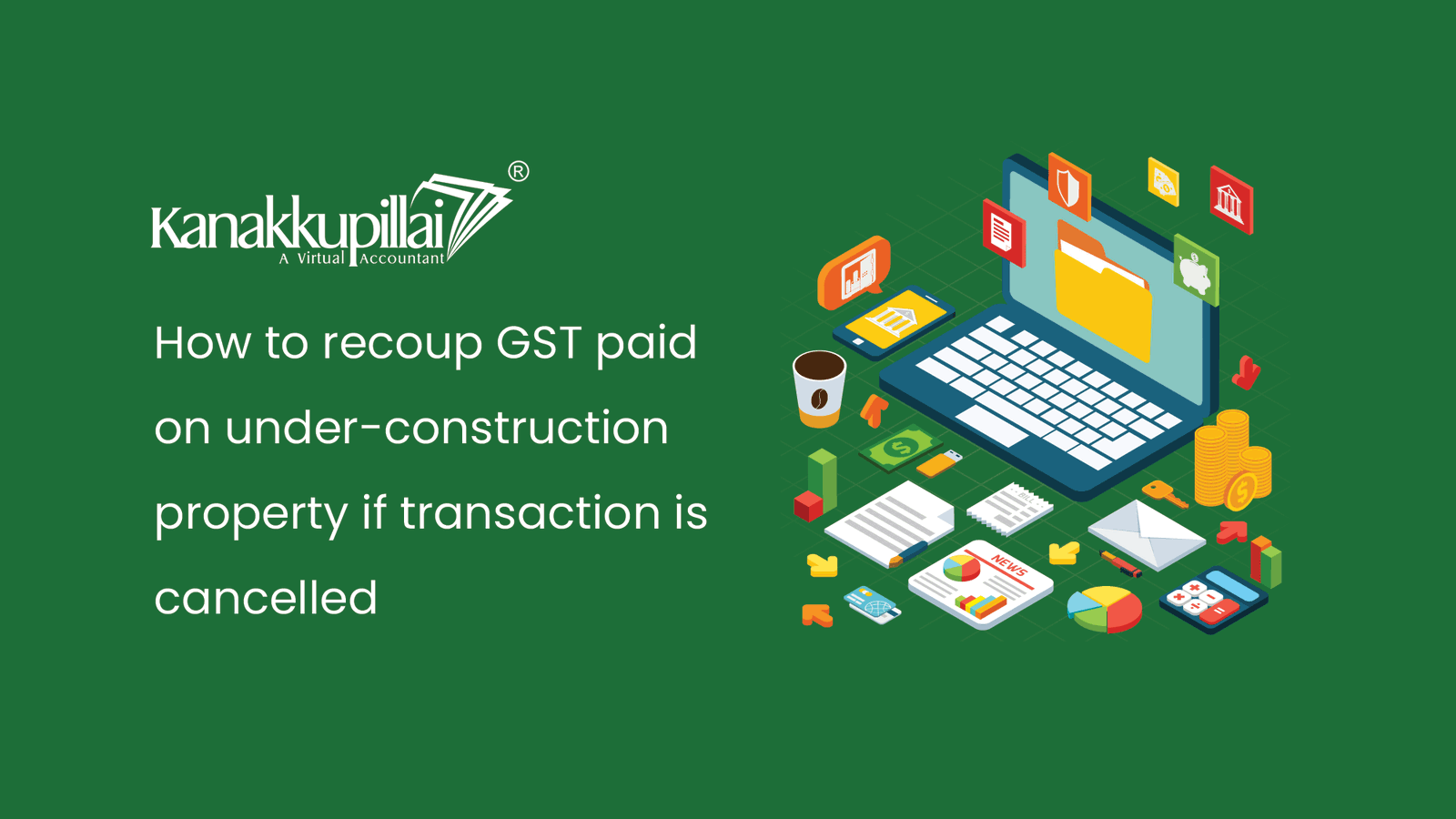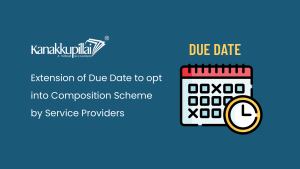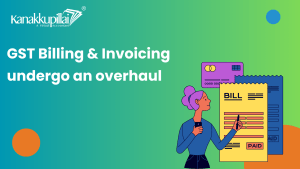![]()
Recoup GST paid on the under-construction property if the transaction is cancelled.
A property contract may be cancelled for several reasons, including failure to obtain required documents or private considerations like a marriage or move. Do you receive your money back from the seller in these circumstances? In the following sections, let’s go into more detail about this.
Real estate deals aren’t always successful. Some agreements are cancelled in the middle for various reasons, such as a lack of funding, legal difficulties, or even an untimely death. Check to see if you may receive your GST back if you need to cancel a reservation for a property.
Can you get a refund of the goods and services tax paid?
Developers are required by law to add GST to agreements for work-in-progress. The mandated GST payment, based on the agreed value and a defined percentage of the property’s market value, must be paid when purchasing or booking a building property. The amount is specified and must be paid in advance. Whether the home the buyer intends to purchase is in the affordable housing segment will determine the GST rate.
If a property reservation is cancelled, the builder of the property and the current dynamics of demand will determine whether or not the GST will be refunded.
The seller may reimburse the booking cost if a contract falls through and is abandoned in the middle. Depending on whether the builder has already deposited the credit to the government, he may or may not agree to repay this sum if GST was collected.
For instance, in 2009, investors in the New Town Heights project in Gurgaon banded together to pressure the developer, DLF, to finish the building or give them their money back.
A buyer’s alternatives are limited if a deal falls through. The buyer has two options: accept their fate or take the seller to court, which may take years to resolve. The buyer does not gain from these solutions, so knowing such return policies is critical.
GST refund for property cancellation deals
In India, you must pay a set amount as the goods and services tax, or GST, when you reserve a property that is still being built. The GST is assessed on the agreed-upon value of the property.
Because they have already rendered the service, the builder is not required to reimburse your GST. If a property sale is cancelled, the builder is the only party responsible for determining whether the GST is repaid.
What does this entail for a cancelled real estate transaction, then? The builder or the seller may be entitled to keep any GST assessments against the property. Remember that the GST charge is typically already paid to the central government within a month of the payment. As a result, it becomes challenging for the seller to refund GST fees.
Granting third-party access to property rights
The sale price includes GST fees if you transfer ownership of the property to a third party while it is being built. In this instance, GST cannot be independently recovered or charged. The GST is factored into the cost of acquisition when calculating capital gains.
Are these capital gains taxable? If you hold them for at least three years, they are indeed taxable as long-term. Profits are otherwise subject to taxation as short-term capital gains.
The bottom line: Who cancelled the property deal?
The answer to the question “Who cancelled the property deal?” is the conclusion. The booking amount, the token amount, and the GST are all lost if a buyer cancels the agreement. The stamp duty fees are guaranteed to be reimbursed, but the registration fee is not. Despite this, the refund policies differ according to the builder-buyer contract.
Current status
After the finer points are ironed out, purchasers of property that is still under construction will soon be able to request a refund of the GST they paid on the property directly from the government if they decide not to proceed with the purchase and the developer’s deadline for refunding their money has passed.
The GST Council made certain proposals during its meeting on December 17 that will have a significant impact. It will benefit many homebuyers, especially those who choose to purchase under-construction homes, among other things.
When a contract or agreement for the supply of services, such as the construction of a flat or house, is cancelled and the deadline for the concerned supplier (the developer) to issue a credit note has passed, the council recommended that the GST rules be changed to allow a buyer to submit a request for a refund.
In other words, if a buyer of a house under construction pays the purchase price and GST but decides to back out before the property is registered, they will receive their GST refund directly from the government if the developer has not yet had a chance to do so.
Tax experts applauded the recommendation since it clears up a lot of uncertainty.
“Refunds to unregistered persons were a sensitive subject for a while, but the GST Council has now bowed to pressure due to the strength of monthly collections.” It is a huge relief for regular customers who previously cancelled their apartment booking or insurance but weren’t reimbursed due to a lack of provisions,” according to Shailendra Kumar, chairman of the fiscal research tank TIOL Knowledge Foundation.
Purchase of a home with goods and services tax
Because a finished property is not regarded as a good or a service, it is exempt from taxation when it is fully constructed and has an occupancy certificate. As a result, if you buy a finished property in either the primary market (straight from the developer) or the secondary market (a resale property), you are exempt from paying GST on the purchase price.
However, you will have to pay the GST in addition to the purchase price if you purchase a property still being built. Nevertheless, the GST rate varies based on the kind of home you’re buying. If you are buying a property that falls within the affordable housing category, the GST rate is 1% of the property value; however, it is 5% for other projects.
To be considered affordable, a home must cost no more than Rs. 45 lakh and have a floor area of no less than 60 square meters in major cities and 90 square meters in non-metro areas.
When GST is paid and how to claim it back if a deal is called off
Residential real estate project construction normally lasts three to four years. When you make an instalment or lump sum payment for the building, GST is also paid. Once the customer has paid the GST, the collector (developer or builder) must pay the government within the allotted timeframe.
If you choose to terminate the contract, you should preferably be reimbursed for the cost of the house and the GST you paid.
On the other hand, developers are only permitted to provide a credit note in exchange for GST payment within a certain time frame. Vivek Jalan, a partner at TaxConnect, said that the statute of limitations is the deadline beyond which you cannot perform an act.
Jalan used an example to illustrate his point: Assume a person paid Rs 2.5 lakh in GST on a Rs 50 lakh condo still under construction in January 2022.
On December 20, he decided to back out of this arrangement. Usually, the builder gave the consumer a credit note, reversed his GST responsibility, and returned the payment.
The builder, however, would not be able to refund this GST amount to the customer because the builder’s time-barring period for issuing credit notes had already passed on November 30 (according to Section 34 of the CGST Act, suppliers cannot issue a credit note for an invoice for FY22 after November 30, 2022).
In the current state of affairs, the consumer would forfeit Rs. 2.5 lakh in GST. According to Jalan, the GST Council has now determined that the government will refund the consumer.
Buyers must apply in order to be eligible for the refund, which will be subject to procedures, conditions, and limitations that will be detailed in the coming days.
Note the following before you cancel a property deal:
There are some things you must ensure before you cancel a property deal:
- Before signing the sale deed, double-check it.
- Justify the agreement’s termination.
- Try to move the purchase to a different building by the same developer.
- Build a network of purchasers to increase pressure.
- Ask for a cancellation contract.
- Avoid paying in cash.
- Always ask for a receipt.
It takes a lot of careful consideration, organization of finances, and documentation to purchase a home. Many property purchasers don’t fully understand what would happen if the deal fell through because of all these complications. To properly spend your hard-earned money, conducting an extensive study or seeking advice from real estate professionals of your choosing is crucial. Based on our discussion so far, we hope this blog will be interesting to all those curious readers in this regard.





